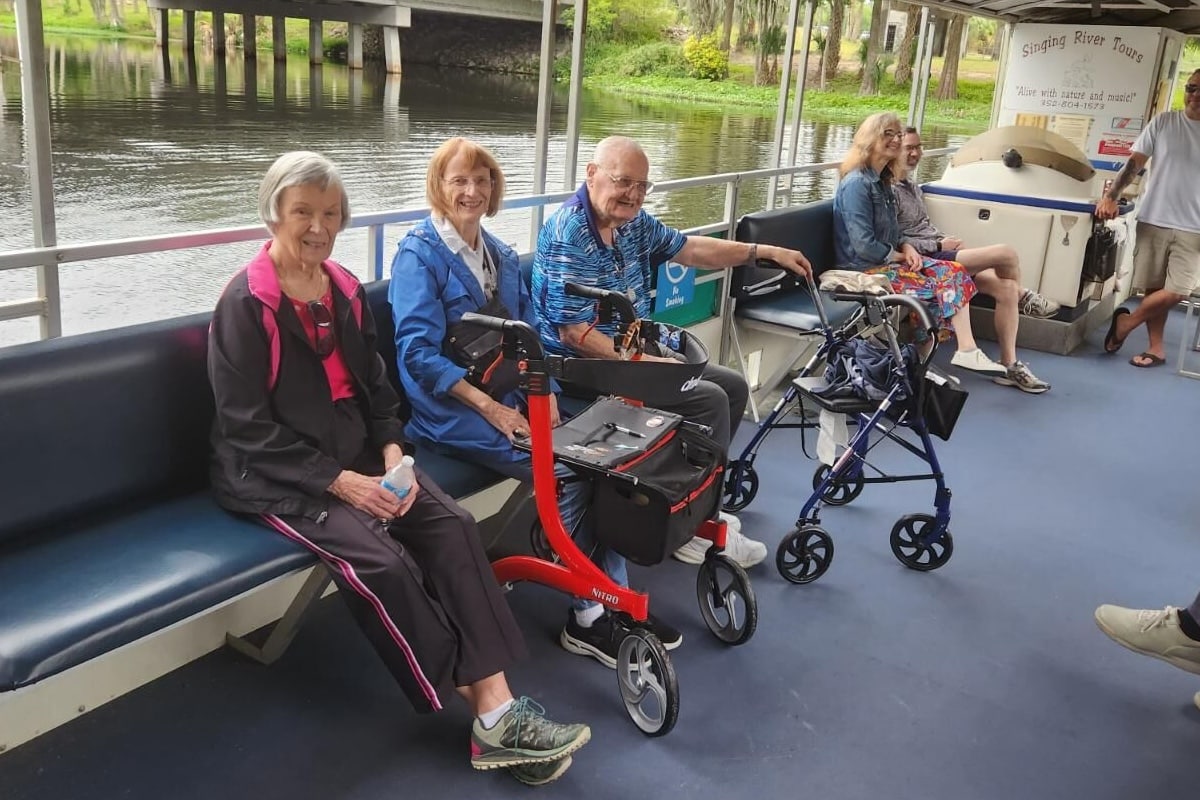Depression isn’t just about feeling blue or sad. It’s a serious condition affecting many seniors, but there’s good news: It’s not a normal part of aging.
At The Harrison of Wildwood, our team advocates for senior mental health. It starts with understanding the signs of depression in seniors and knowing how to help. Continue reading to learn about recognizing the symptoms and incorporating lifestyle changes that can improve their mood and well-being.

Recognizing Signs of Depression in Seniors
Depression in older adults often goes unnoticed. Here are some signs to watch out for:
- Loss of interest in activities they used to enjoy.
- Changes in appetite or weight.
- Sleep disturbances, like insomnia or sleeping too much.
- Feeling sluggish or agitated.
- Feelings of worthlessness or excessive guilt.
- Difficulty concentrating or making decisions.
If you notice these symptoms persisting for over two weeks, it might be time to seek help. Call the SAMHSA’s National Helpline for free, confidential mental health assistance at 1-800-662-4357.*
Depression in Seniors: Statistics and Realities
Depression is a significant concern among older adults, a group at an increased risk for this condition. It’s crucial to understand that depression is not a normal part of aging but a treatable medical condition.
Despite common misconceptions, older adults can experience relief from depression through proper treatment. Statistics reveal lower depression rates among older adults living in community settings. Estimates vary from less than one to about five percent.
For older individuals living alone and receiving home healthcare, the prevalence of major depression escalates to 13.5 percent. Hospitalized seniors experience depression at a rate of 11.5 percent. These figures underscore the critical need for awareness and intervention among healthcare providers and family members.
Factors Contributing to Senior Depression
Several factors can contribute to depression in seniors, including:
- Medical conditions: Chronic pain or illnesses can lead to depression.
- Loneliness and isolation: Being separated from family or losing friends or a spouse can trigger depressive feelings.
- Physical decline: Health conditions and a loss of independence can affect a senior’s mental health.
- Medication side effects: Depression is a side effect of some medications.
Still, most older adults receiving treatment for depression through medications, psychotherapy, or a combination see a significant improvement in their symptoms. That highlights the importance of seeking help and the effectiveness of current treatment options available to seniors.
Senior Mental Health Services
Family members, healthcare professionals, and senior living communities play vital roles in supporting older adults dealing with depression. Understanding the statistics and the reality of depression in older adults also helps combat the stigma associated with mental health issues in this age group.
It’s wise to seek help if you suspect your loved one is experiencing depression. Consult some of the senior mental health services available near you:
- Mental health professionals: Psychologists and psychiatrists can develop a treatment plan tailored to seniors’ needs.
- Medical review: A doctor can review medications to identify those with depressive side effects.
- Support groups: Sharing experiences with others facing similar challenges can be comforting.
Practical Tips for Family Members
Accompanying your loved one to a mental health counselor can make a significant difference in facilitating the diagnosis and treatment process. Encourage open conversation and let them know it’s okay to talk about their feelings without judgment.
If you see signs of depression in a senior, encourage a healthy diet and regular exercise. Support their independence and help them stay active and involved–find clubs or groups that match their interests and social structures.
Depression is not an inevitable part of aging, and with proper support, seniors can overcome it. If you believe a loved one is clinically depressed, reach out to mental health services for seniors. Creating a supportive environment and seeking professional help are critical steps for helping seniors with depression.
How Moving to a Senior Living Community Can Help
Moving into a senior living community can help seniors who are experiencing depression. These communities provide supportive, caring environments, which can make a big difference.
Senior living communities provide:
- Social interaction
- Physical activities
- Access to care
- Structured routine
One key benefit of The Harrison of Wildwood is the opportunity for social interaction. Our residents have busy calendars full of social events, clubs, and activities. Participating in these activities reduces common depression triggers like loneliness.
Remember, physical health is closely linked to mental health. Our fitness center, fitness activities, and wellness programs are tailored for older adults. These activities can improve overall health and boost mood and mental well-being.
Health issues like mismanaged medications might also contribute to feelings of senior depression. These can be handled more effectively in senior living communities. On-site or on-call care provides further peace of mind and ensures residents receive prompt, appropriate support.
Senior communities also help residents maintain a daily schedule, including meals, activities, and social events. Structured routines provide seniors with a sense of purpose and stability. It brings a comforting sense of normalcy and predictability, contributing to an overall improvement in mood and mental health.
The Harrison of Wildwood Proactively Addresses Senior Depression
Our assisted living and memory care community offers a multifaceted approach to combating depression in older adults. Contact The Harrison of Wildwood in Wildwood, Florida, to request a tour of vibrant senior living.
*This blog is for informational purposes only. If you or a loved one is experiencing a mental health crisis, please contact a healthcare professional immediately for help.







